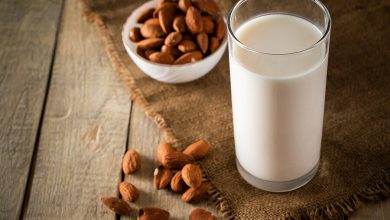Diet And Alzheimer’s: Is There A Relationship?

Alzheimer’s is a disease characterized by the deterioration of cognitive functions such as memory and by behavioral disorders. The patient may present personality changes, disorientation of time and space, impaired judgment, and in the last case, ignorance of himself.
Alzheimer’s is not reversible. During the degenerative process of the disease, a substance called beta-amyloid is created. This interacts with nerve cells, causing senile plaques, and achieving the advancement of neurodegenerative diseases. The exact causes of this disease are unclear, although beta-amyloid is believed to play a major role. This protein can clump together to form plaques that disrupt communication between neurons.
Despite scientific, researcher and medical studies, no cure has yet been found. However, there are treatments capable of slowing down the effects of the disease.

Green tea to prevent Alzheimer’s
Alzheimer’s is a progressive neurodegenerative disease that affects almost 50 million people on the planet. In fact, it is estimated that by 2050 more than 130 million people could be affected.
Various investigations, such as that published in 2018 by the Nutrients magazine , have shown how a compound in green tea is capable of altering the formation of toxic plaques that contribute to the development of the problem.
Apparently, green tea would have anti-amyloid compounds, which through certain mechanisms could reduce the risk of Alzheimer’s or improve cognitive function in the elderly.
Citrus and alcohol in moderate amounts
Citrus fruits could have a neuroprotective effect. This is confirmed by research such as the one published in 2017 by the journal CNS & Neurological Disorders – Drug Targets. Apparently, this would be thanks to nobiletine and tangeretin, important citrus flavonoids derived from the peel, which have been shown to exhibit neuroprotective effects in several studies.
On the other hand, it is known that drinking alcohol in excess can lead to early development of cognitive problems. However, it seems that consuming alcohol in moderate amounts could have a protective effect in the case of Alzheimer’s.

Coffee and chocolate
Coffee is the second most consumed beverage on the planet. Drinking coffee may be associated with a decreased risk of Alzheimer’s. This may be mediated by caffeine and / or other mechanisms such as antioxidant capacity and increased insulin sensitivity. This is confirmed by a research published in 2010 by Finnish researchers.
The Pan American Health Organization recommends consuming 3 to 4 cups of coffee a day. What are 300 or 400 mg of caffeine.
Similarly, Dr Giovambattista Desideri, from L’Aquila University, in Italy, assures chocolate is one of the foods with the greatest capacity to improve cognitive abilities. This helps prevent the onset of Alzheimer’s.
In addition, it is also effective in preventing other brain diseases. This is, improving blood flow to the brain and taking care of neurons.
Coconut oil and fruits
A study from Spring Hill Regional Hospital showed how coconut oil might be helpful in keeping some brain cells healthy.
Dr. Mary Newport tried experimenting with many products to combat her husband’s Alzheimer’s. Finally, when experimenting with coconut oil and other chemical treatments in combination, she noticed some improvements.
Melatonin supplementation to prevent Alzheimer’s
In recent years, the role of melatonin supplementation in the prevention of neurodegenerative pathologies has been investigated. This hormone is secreted in the pineal gland and regulates sleep cycles. It is capable of promoting proper rest and recovery of the body.
A chronic intake of it has been associated with a lower state of inflammation and oxidation, which could be beneficial in order to prevent the development of age-related diseases. It could even have an impact on the microbiota, increasing intestinal permeability and reducing the number of amyloid compounds that pass into the systemic circulation. Thus, the accumulation of these toxins in the brain area can be prevented, which would be related to cognitive problems.
To get the most out of the supplement, it is recommended to consume 5 mg of melatonin daily, before sleeping.

Take care of habits to prevent Alzheimer’s
In short, there is no specific formula to prevent Alzheimer’s. However, it seems that eating the foods we have described might help. Either way, we recommend that you consult a specialist if you think you may have memory loss.
Also keep in mind that maintaining good sleep hygiene and practicing physical exercise on a regular basis also help reduce the incidence of the disease. Developing cognitive activities during adulthood through study and memory exercise will delay brain aging.








